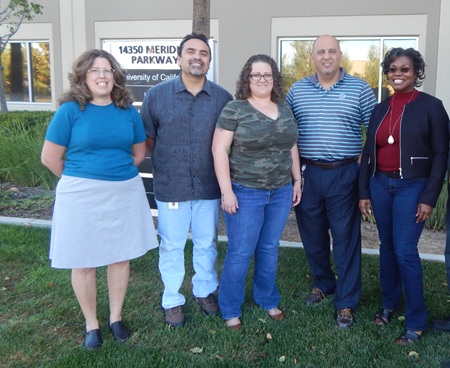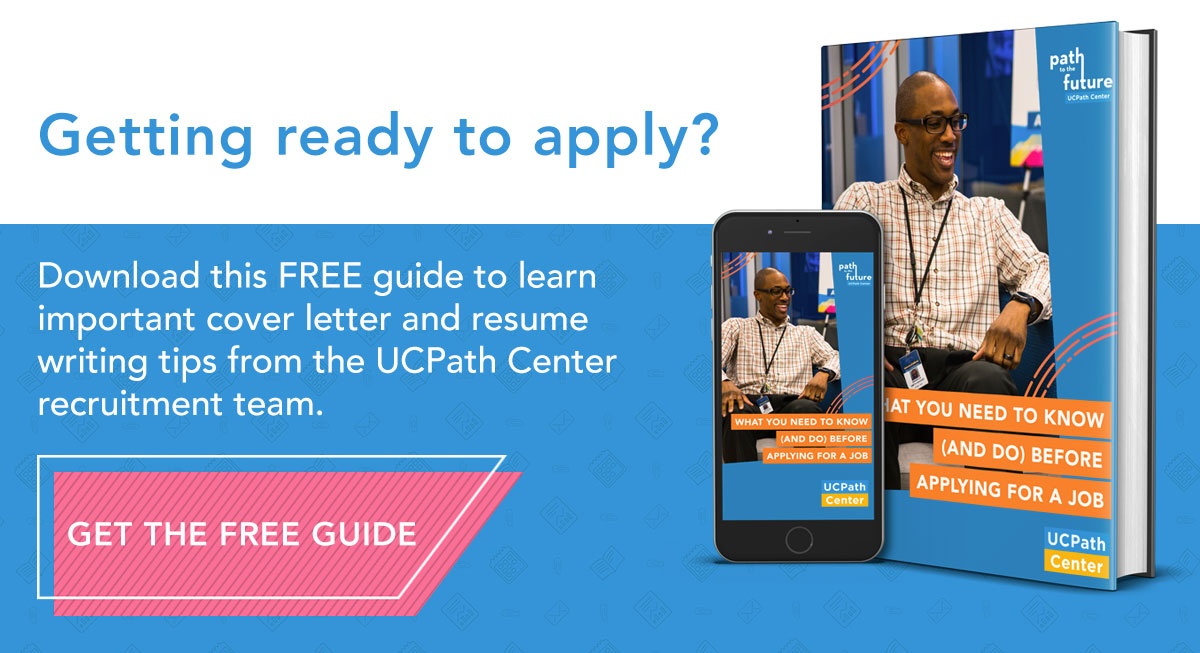The U.S. military has a proven track record of instilling leadership skills, encouraging creative problem solving and fostering flexibility in changing circumstances. According to three military veterans currently working at UCPath Center, these traits have helped them successfully transition to a civilian career.
Stephanie Egan, senior employee services associate, recalled that during her four years in the Army she often had to think on her feet, while coming up with innovative ideas.
“The leadership experience I had in the Army (of working together as a team) is helping me in my new work role,” she added. “At the UCPath Center, I have faced similar challenges in the past year such as– ‘Can our teams be agile?’ and ‘Can we solve these problems together?’”

Exemplifying Leadership
With a technical background during a decade of service in the Marine Corps, Ed Trujillo said his career came full circle when he joined the UCPath Center.
Currently, Trujillo has three people reporting to him directly in the Information Technology Shared Services department to transform the delivery of benefits and payroll services throughout the University of California. “This is the biggest project I’ve ever been on in my career,” said the IT lead business analyst.
Trujillo explained his team is about to embark on the project’s next phase — by integrating 16,000 additional University of California employees onto the application. As a result, the IT department will be  . “As a leader, you can’t be stuck in the woods,” Trujillo noted. “You must be flexible, have the ability to overcome challenges and lead by example.”
. “As a leader, you can’t be stuck in the woods,” Trujillo noted. “You must be flexible, have the ability to overcome challenges and lead by example.”
The UCPath Center is hiring. Here’s why you should work here.
Joanna Finnell, a recent new hire for the garnishment team in the payroll department, said she was confident during her interview when the recruiter asked her to discuss her 20-year career in the Coast Guard and how she would relate her skills to what they do at the UCPath Center.
“I was able to express my technical and soft skills, and I placed a huge emphasis on my leadership skills that I had developed and honed throughout my military career,” the payroll supervisor continued.
Finnell said coming onboard at the UCPath Center was a seamless transition. “I acclimated to the culture right away,” she added. “In my current role here, I am able to exercise my leadership skills, my ability to work as a team player and my ability to resolve issues as they arise.”
UC Helps Vets Return to Work

UC is committed to assisting returning service members with resources they need for success.
UC launched a website in November of 2017 to help military veterans transition to a civilian career, where they can access the university’s job board, learn about the university’s salaries and benefits, and check out upcoming networking events. The website also offers tips on how to write a resume, prepare for an interview and network.
“Military veterans have unique skills and experiences that can serve them well in the civilian workforce, and there are countless opportunities they can pursue at UC,” Vice President Dwaine B. Duckett of systemwide human resources said in a statement. “This is one of many first and foundational steps in ensuring we are sourcing talent from this key constituency — veterans — in our community.”
Tips for a Successful Military Career Transition
While transitioning from military to civilian life can seem like a daunting task, UCPath Center veterans suggested taking it one step at a time.
1.Contact a transitioning coordinator for pre-separation counseling and information on transition services and benefits. “Utilize the tons of transitioning support programs available,” Finnell said. “The military helps transitioning members at least two years before getting out.”
2. Attend military transition courses like the Transition Assistance Program (TAP), a workshop that covers career exploration, job search strategies and resume, cover letter and interview preparation. “Make the most out of this opportunity – I’d even suggest attending it twice,” Egan added.
3. Expand your network circle. While Egan advised to tap into a community of veterans to find opportunities, Finnell suggested going one step further, and make contacts outside the military. “There are a lot of veterans already in the civilian workforce who will be more than happy to help a fellow veteran on their job pursuit,” she added.
4. Go into civilian culture with an open mind. The transition can be difficult because of the intense competition for jobs, Trujillo said. “Few military roles transition directly into a civilian role,” he added. Nevertheless, he advised military vets to emphasize their ability to overcome obstacles when seeking a civilian role.
“Be open-minded to your job search because sometimes the position title may be unfamiliar to you, but if you give yourself time to understand the job descriptions, you may realize that it is comparatively similar to what you done in the military,” Finnell concluded. “The most important item is to do your due diligence to research on the organization, so you can affirm that you can fit well in that organization and support that organization’s mission.”





